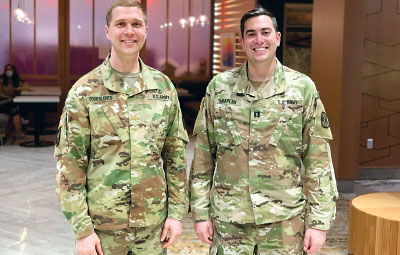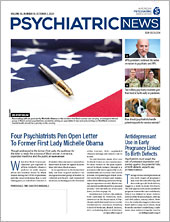In response to the COVID-19 pandemic, the U.S. Armed Forces mobilized a wide array of resources to support cities and regions impacted by the pandemic, from hospital ships to mobile field hospitals. Two such units, the U.S. Army’s 9th Hospital Center out of Fort Hood, Texas, and the 531st Hospital Center out of Fort Campbell, Ky., were mobilized in March to establish a field hospital at the Jacob K. Javits Convention Center in New York City in support of expanding the city’s medical capacity. Among the soldiers deployed were two Army psychiatrists, Captain Alexander Kaplan and Major Olli Toukolehto, whose last visit to the Javits Center was for the APA Annual Meeting just two years prior. Their experiences shed a unique light on what it means to be a psychiatrist in the era of COVID-19.
It was the end of a typical week staffing the inpatient psychiatric ward at Fort Hood when Kaplan first received the call. His spine instinctively straightened when he realized it was his commander calling and stiffened more so with a sense of purpose when he heard the words “prepare to deploy orders.” Leaving behind his fiancé, he flew to New Jersey and on to New York City within the next week. This was Kaplan’s first deployed mission. Less than a year earlier, he had completed his tenure as chief resident, a role in which he earned universal admiration for serving and caring for each of his residents with the same level of humanistic dedication he had given his patients.
Halfway across the United States at Fort Belvoir, Va., on the outskirts of Washington, D.C., Toukolehto had received similar orders. Though to him, the process of deploying was more familiar. He had already deployed to Iraq twice—once in 2005-2006 before medical school as a lab technician and a second time in 2016-2017 as a psychiatrist. Forty-eight hours after having received his orders, Toukolehto was at Fort Campbell, preparing to deploy with the 531st Hospital Center.
Upon arrival at the Javits Center, Kaplan and Toukolehto were among hundreds of a wide range of health care professionals and support staff who shared a sense of camaraderie and purpose serving the citizens of New York City during the pandemic. Initially, multidisciplinary teams of three to four physicians, regardless of specialty, collaborated on admitting a single patient—for Kaplan’s first admission, he was joined by an OB/GYN and a general surgeon. This meant that many types of physicians, including psychiatrists, were practicing general medicine—a role in which Toukolehto and Kaplan were prepared for due to their military medical training in residency and beyond.
As patient censuses eventually increased, the physicians were gradually able to shift toward practicing primarily within their specialty. For Toukolehto and Kaplan, this meant they were primarily practicing general medicine until they were able to establish an inpatient psychiatric ward and consultation-liaison service.
Kaplan also emphasized at the Javits that “what’s just as important as taking care of the patients is taking care of the providers.” This was accomplished in part with the creation of a resilience center staffed by several social workers, which included separate rooms for yoga, meditation, and individual therapy for patients, health care professionals, and staff. Daily walkarounds and routine interactions with other health care professionals and staff also established the behavioral health team as an approachable presence, thus lowering the barriers to access care.
Although they trained in different Army residency programs—Toukolehto at Walter Reed National Military Medical Center in Washington, D.C., and Kaplan at Tripler Army Medical Center in Honolulu, Hawaii—both Toukolehto and Kaplan echoed similar sentiments that their ability to adapt and thrive in a novel environment is largely attributable to their respective residency programs. Their military residency training not only emphasized excellent clinical care but also placed additional emphasis on strengthening competencies in leadership, adaptability, and interdependence—traits that allow for military physicians to better adapt and thrive in challenging environments.
Toukolehto and Kaplan stand as reminders that psychiatrists are not entirely beholden to the traditional paradigms that govern what it means to practice psychiatry. As the landscape of medicine experiences a tectonic shift in response to this global pandemic, we have a choice. We can decide to wait for patients’ needs to fit our practice or we can adapt our practice to meet patients’ needs. ■
Aaron Wolfgang, M.D., and Sean Wilkes, M.D., M.Sc., would like to extend their gratitude to Olli Toukolehto, M.D., and Alexander Kaplan, M.D., M.P.H., for their contributions not only to this article but also to the citizens of New York.
The views expressed in this publication are those of the authors and do not reflect the official policy or position of the Department of the Army, Department of Defense, or the U.S. government.

